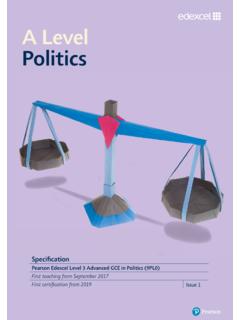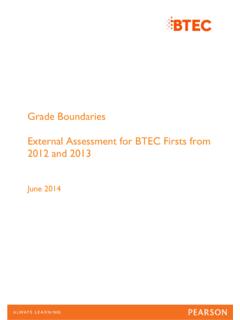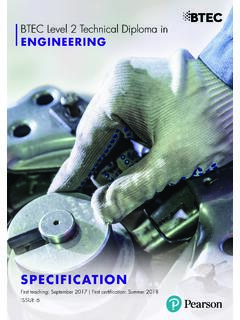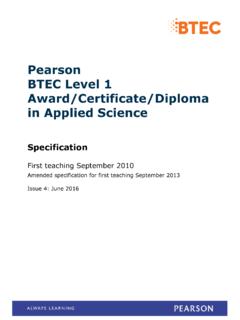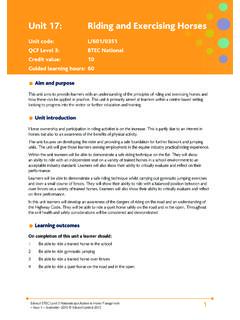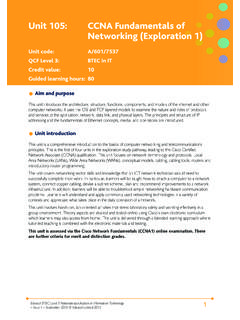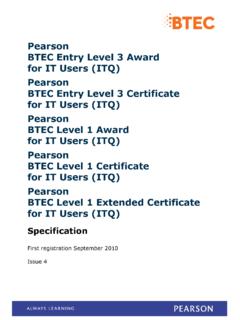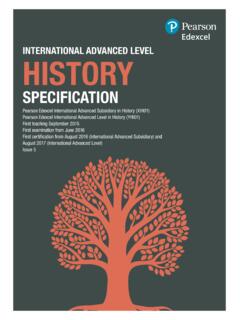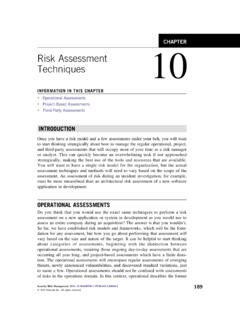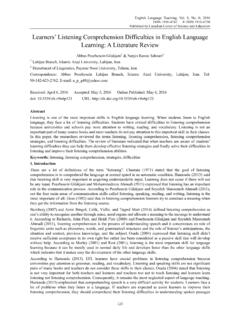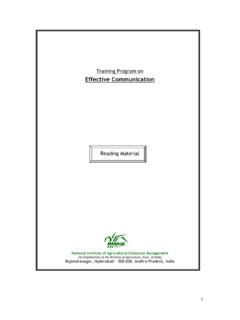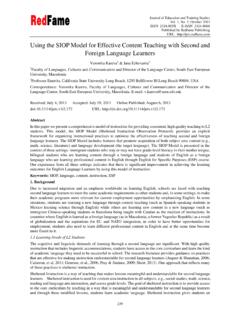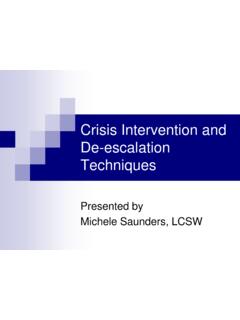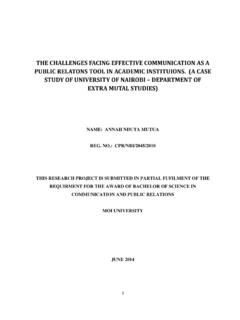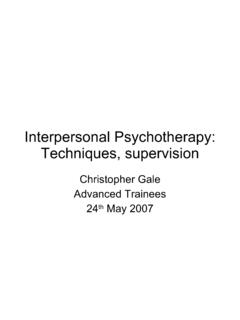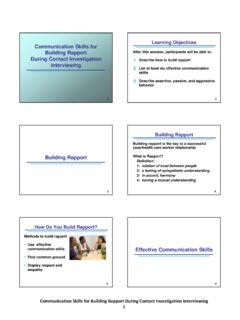Transcription of Unit 45: Contribute to Effective Team Working in Care Settings
1 978 1 446 95317 4 Pearson BTEC Level 3 Diploma in Adult Care (England) Unit Issue 1 January 2018 Pearson Education Limited 2018 1 Unit 45: Contribute to Effective Team Working in Care Settings Unit reference number: D/616/7382 Level: 3 Unit type: Optional Credit value: 4 Guided learning hours: 25 Unit summary This unit gives learners the knowledge, understanding and skills required to Contribute to Effective team Working in care Settings . You will explore the ways that you can support and motivate colleagues to work cohesively towards meeting objectives in your own organisations. At the end of this unit, you will be able to reflect on your skills and knowledge, and identify ways that you can develop your team- Working skills to Contribute to the continuous improvement of care practice and provision. This unit enables you to develop the skills you need to work collaboratively with others as part of a team.
2 You will do this through understanding primary theories and models of team Working and the principles that guide Effective teamwork. You will demonstrate how you work as part of a team to carry out your roles and responsibilities. 978 1 446 95317 4 Pearson BTEC Level 3 Diploma in Adult Care (England) Unit Issue 1 January 2018 Pearson Education Limited 2018 2 Learning outcomes and assessment criteria To pass this unit, the learner needs to demonstrate that they can meet all the learning outcomes for the unit. The assessment criteria outline the requirements the learner is expected to meet to achieve the unit. Learning outcomes Assessment criteria 1 Understand theories of teams and team Working Outline models of team Working Explain the process of team development Analyse how shared goals can lead to team cohesion 2 Understand the principles that underpin Effective teamwork Explain principle objectives underpinning team Working Explain why mutual respect and support promotes Effective teamwork Explain how the values of own organisation influences the Working of your team Explain how teams manage change Explain the benefits of Effective team performance 3 Be able to work as part of a team Identify own role and responsibility in the team Fulfil own responsibilities within the team Communicate effectively with team members Involve other team members in decision making Seek support and advice from others Offer support to other team members Explain lines
3 Of reporting and responsibility in the team Analyse the strengths and contributions of other team members to the work of the team 4 Be able to support individual team members Provide encouragement and support to individual team members within their roles Provide constructive feedback on performance to individual team members 978 1 446 95317 4 Pearson BTEC Level 3 Diploma in Adult Care (England) Unit Issue 1 January 2018 Pearson Education Limited 2018 3 Learning outcomes Assessment criteria 5 Be able to review the work of the team Reflect on own performance in Working as part of a team Review team performance in achieving or Working towards goals Contribute to the development of continuous improvement within the work of the team 978 1 446 95317 4 Pearson BTEC Level 3 Diploma in Adult Care (England) Unit Issue 1 January 2018 Pearson Education Limited 2018 4 Content What needs to be learned Learning outcome 1: Understand theories of teams and team Working Models and process of team development Team models Temporary (assist permanent team members, dissolved when task complete).
4 Permanent (ongoing task performance, not dissolved when task complete, move to different tasks). Committee (set tasks, permanent or temporary, have common interests/background). Virtual (teams connected via ICT). Self-managed (work together, no supervisory leader). Other team types, interdependent, task force, organisational, cross-functional. Process of team development Tuckman s stages of team development: o forming (depending on leader for direction, individual roles in infancy) o storming (team members compete for positions within team) o norming (team members accept their roles and responsibilities and cooperate) o performing (positive team functioning, shared vision, leader delegates) o transforming (positive if the team is moving onto a new project, state of mourning if completion). Belbin s team role theory: o nine team roles, including resources investigator, team worker, co-ordinator, plant, monitor evaluator, specialist, shaper, implementer, completer finisher.
5 Action-oriented roles (AOR): o shaper (SH) (good at motivating others and keeping the team on target, can be aggressive or behave badly while trying to keep team on target) o implementer (IMP) (practical and efficient in planning work, can be inflexible if alternative, more- Effective plans are put forward by other team members) o completer finisher (CF) (high standards and good at evaluating teamwork, can be too picky). People-oriented roles (POR): o resource investigator (RI) (strong competitor with sector knowledge, can become forgetful and distracted from the purpose) o co-ordinator (CO) (focused on team goals and good at delegation, may delegate too much work away from themselves) o team worker (TW) (flexible and good at supporting team dynamics, can struggle to make decisions when facing opposition from other team members). 978 1 446 95317 4 Pearson BTEC Level 3 Diploma in Adult Care (England) Unit Issue 1 January 2018 Pearson Education Limited 2018 5 What needs to be learned Thought-oriented roles (TOR): o plant (PL) (highly creative and good at problem solving; unconventional, forgetful) o monitor-evaluator (ME) (logical and impartial, too critical and slow) o specialist (SP) (in-depth knowledge of a specific area, may not see the bigger picture or be able to work flexibly in different areas).
6 Ways shared goals can lead to team cohesion Mutual understanding of the needs of the organisation. Team members work to a common goal. Commitment to team. Supportive team climate. Knowing destination and achieving milestones and targets. Developing Working techniques that make use of team Working . Developing opportunities for collective learning and knowledge exchange. Sense of empowerment. Learning outcome 2: Understand the principles that underpin Effective teamwork Principle objectives underpinning teamwork Effective communication to and from: o colleagues o managers o professionals o individuals, families and carers. Mutual respect and support in promoting Effective teamwork Ability to adapt and manage change. Shared vision to achieving organisational objectives. Good approach to conflict management. Strong and Effective leadership within own role and responsibilities. Effective allocation of resources.
7 Mutual respect among team members. Constructive and collaborative Working relationships. Positive approach to diversity and equality. Professionalism in upholding organisational values. Motivation, innovation and ambition. Values of organisation influence team Working Collective commitment to work to organisational values. Creating an environment where good team Working brings about: o respect for organisational policy, rules o meeting deadlines o helping others o positivity, reliability o quality of practice and provision o making a difference o accountability o social responsibility. 978 1 446 95317 4 Pearson BTEC Level 3 Diploma in Adult Care (England) Unit Issue 1 January 2018 Pearson Education Limited 2018 6 What needs to be learned Team change Team involvement in decision making and planning. Aid understanding for the need for change. Addressing and discussing concerns. Supporting and developing innovation and creativity.
8 Team cohesion and support. Creating emotional moments. Create an environment of openness, trust and reciprocity. Use of problem-solving techniques, force field analysis, SWOT, root cause analysis, brainstorming. Benefits of Effective team performance Collective achievement of goals and objectives. Demonstrates professionalism. Avoids misinterpretation and conflict. Projects positive image of organisation. Supports quality practice and provision. Confidence of individuals in services provided. Improvements in work output. Customer relations/retention. Profitability. Reputation. Staff motivation and retention. Learning outcome 3: Be able to work as part of a team Roles and responsibilities within teams Identifying own and others roles and responsibilities within team. Own strengths and contribution. Others strengths and contribution. Carrying out own roles and responsibilities to promote team Working .
9 Communicating effectively Use of appropriate communication skills to meet individual needs. Use of technical language in different situations. Types of communication: o verbal (face to face) o written (email, text, video, formal letters, notes) o non-verbal (body language, facial and hand gestures, eye contact). Decision making Work collaboratively. Make decisions. Encourage ideas and suggestions for change, development. 978 1 446 95317 4 Pearson BTEC Level 3 Diploma in Adult Care (England) Unit Issue 1 January 2018 Pearson Education Limited 2018 7 What needs to be learned Support and advice Positive role model. Recognise and acknowledge the strengths of others. Support others to complete job roles, coaching and mentoring. Seek opinions. Motivate, support and inspire others. Seek advice and support from others. Provide support and advice to others. Lines of reporting and responsibility Follow organisational policies and procedures.
10 Chain of responsibility (line management). Record information. Sources of support and advice, colleagues, line managers. Learning outcome 4: Be able to support individual team members Encouragement and support to team members Use of coaching and mentoring techniques. Shadow, including observation of practice. Model best practice. Provide information, training, research, media news. Constructive feedback on performance to others Create rapport, engage in dialogue over non-work issues. Demonstrate positive body language, active listening, hand gestures, facial gestures. Ask open questions, encouraging team member to identify own strengths and areas for development. Start with positive, move to constructive. Ensure clarity of message. Use examples from own experience or feedback from others. Explain impact of behaviour or skill on colleagues/organisation. Echo concerns. Check understanding.
